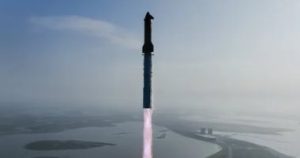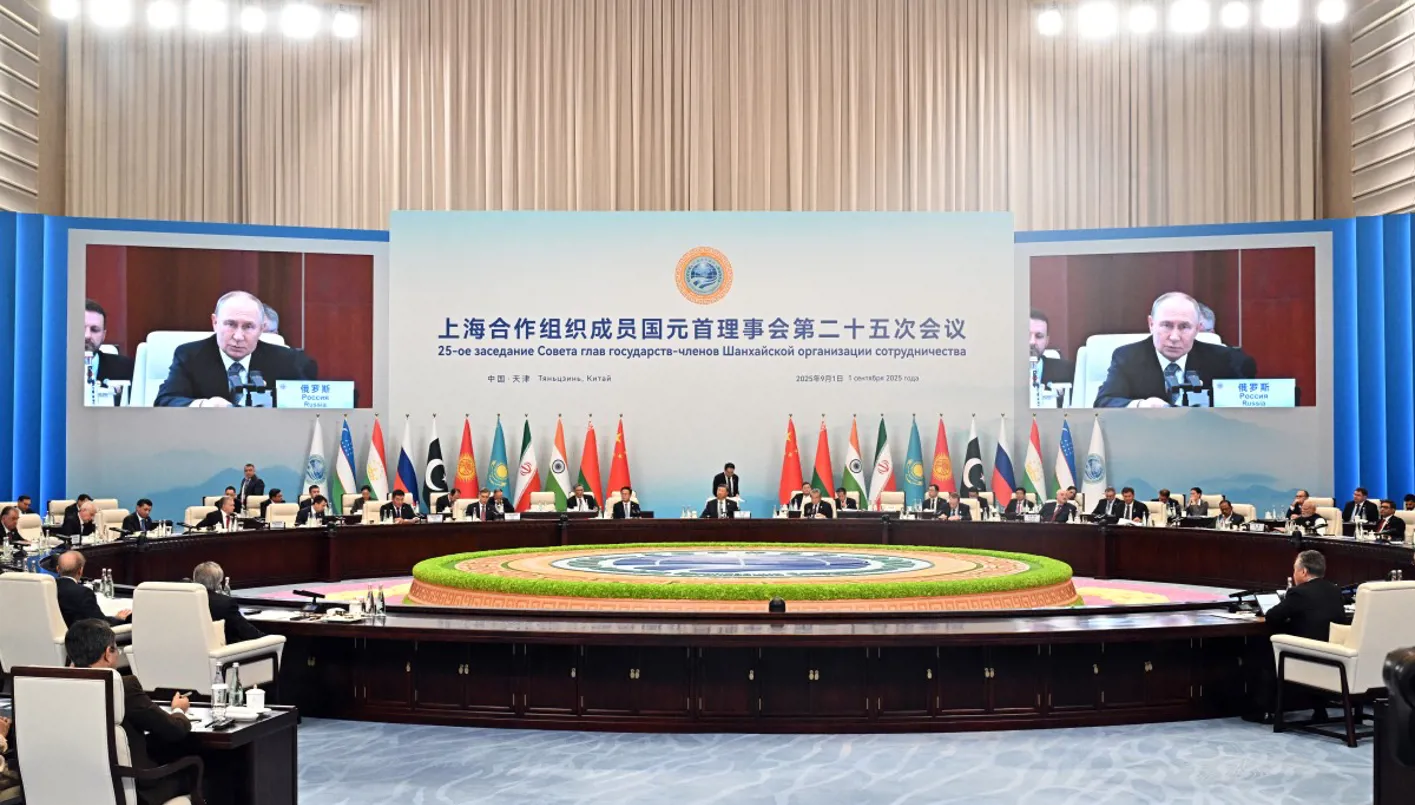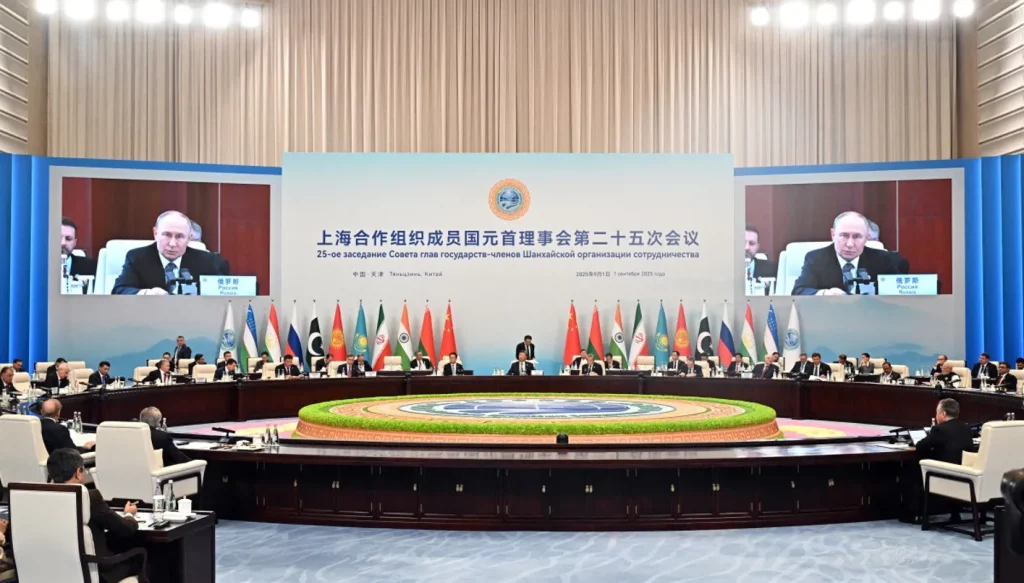Le sommet de Shanghai a marqué un but important contre l’équipe américaine. (Sputnik/AFP)
Le sommet de l'”Organisation de Shanghai” qui s’est tenu début septembre dans la ville chinoise de Tianjin a adressé un carton jaune au puissant joueur américain, à un moment sensible de la première mi-temps dirigée personnellement par le président Donald Trump depuis le début de son second mandat en début d’année.
La réunion du sommet a réuni les chefs des dix États membres de l’organisation, ainsi que les dirigeants des 16 pays observateurs, accompagnés de 10 représentants d’organisations internationales influentes. C’était la première fois que tous ces hauts responsables participaient ensemble. La surprise inattendue fut la présence du Premier ministre indien Narendra Modi après une quasi-rupture de sept ans avec la Chine.
L’image de Modi avec le président chinois Xi Jinping et le président russe Vladimir Poutine fut la plus marquante, provoquant un choc chez les décideurs à Washington, car elle est intervenue après des efforts intenses de l’administration Trump pour creuser l’écart entre la Russie et la Chine d’une part, et pour approfondir l’éloignement — voire l’hostilité — entre la Chine et l’Inde d’autre part. Cette administration a offert d’importantes incitations à Moscou, notamment sur le dossier ukrainien, pour renforcer un partenariat qui inquiète Pékin. Elle a également élevé le statut international de l’Inde en tant que concurrent le plus proche de la Chine, surtout après que l’Inde l’a dépassée en population, occupant la première place mondiale à cet égard.
La décision de l’Inde d’activer son rôle dans l’Organisation de Shanghai et auparavant dans le BRICS n’est pas un hasard, mais résulte d’un plan délibéré, portant une nouvelle vision qui blâme les États-Unis pour avoir imposé une augmentation de 50 % des droits de douane sur les exportations indiennes, et rejetant la demande du président Trump à New Delhi d’arrêter d’importer d’importantes quantités de pétrole et de gaz russes et de réexporter une partie vers les marchés mondiaux. La présence de Modi au sommet de Tianjin lui a donné un fort élan, malgré l’importance de la présence des autres dirigeants, notamment ceux de la Turquie, de l’Iran, de la Serbie et de la Slovaquie, en raison de leur rôle important dans cette phase sensible des relations internationales.
Depuis qu’il a pris la direction à Washington pour son nouveau mandat, le président Trump s’est comporté comme s’il était le chef du système mondial, et pas seulement le président des États-Unis. Il a commencé à distribuer les rôles aux organismes et aux régions, imposant des restrictions douanières, politiques et militaires à de nombreux pays, allant jusqu’à annoncer son intention d’effectuer des changements géopolitiques, y compris l’achat ou l’annexion d’entités et d’îles à la souveraineté américaine. Ses mesures ont touché amis et rivaux, sans épargner ses alliés de l’OTAN des critiques, des restrictions et parfois des menaces. Il a marginalisé leur rôle en Ukraine et au Moyen-Orient, leur demandant d’aligner leur politique envers la Chine et l’Inde sur celle des États-Unis, parfois au détriment de leurs intérêts nationaux.
Quoi qu’il en soit, le sommet de Shanghai constitue une gifle politique importante à la politique américaine, servant de carton jaune clair au président Trump, pouvant conduire à suspendre sa participation parmi les grands joueurs, même s’il reste le plus fort. Il avait commencé à jouer en équipe avec alliés et adversaires, espérant accroître son influence sur la scène internationale, notamment avec les pays d’Asie de l’Est et l’Australie. Son armée a mené des manœuvres militaires séparées avec chaque pays, en particulier l’Australie, le Japon, les Philippines et l’Inde, imposant un modèle relationnel différent avec chacun, sans normes douanières ou sécuritaires uniformes.
Le sommet de Shanghai a atteint un objectif important contre les États-Unis, indiquant une future position internationale différente, car les pays participants représentent environ un tiers de la population mondiale et leurs économies combinées dépassent 24 % du revenu mondial. Le sommet n’a pas négligé l’aspect militaire, puisque la plupart des présidents participants étaient invités à une célébration sur la place Tiananmen à Pékin, comprenant un grand défilé militaire à l’occasion du 80e anniversaire de la fin de la Seconde Guerre mondiale et de la victoire sur le Japon. Le leader nord-coréen Kim Jong-un a participé pour la première fois, ajoutant une saveur particulière, son pays possédant un arsenal nucléaire avancé et entretenant des relations tendues avec les États-Unis.
La puissance des États-Unis sur la scène internationale est indéniable ; ils restent le joueur le plus fort sans concurrent. Cependant, jouer seul ne suffit pas pour gagner la partie, quelle que soit la capacité du joueur ; une équipe avec une répartition des rôles est nécessaire, notamment en défense et en contre-attaques.
Washington, malgré sa force, souffre de déséquilibres importants, laissant de nombreuses failles exploitables par ses adversaires. Ses relations avec ses alliés européens sont au plus bas, ceux-ci reprochant à la nouvelle administration de marginaliser leur rôle et de menacer leurs espaces géographiques, notamment par la demande d’annexion du Groenland, la gigantesque île danoise. Les pays arabes critiquent l’administration Trump pour sa couverture des politiques agressives et injustes d’Israël contre les Palestiniens et les États voisins, s’opposant à la solution à deux États approuvée par la communauté internationale. L’ONU et ses agences spécialisées souffrent de marginalisation en raison des sanctions et du ciblage américain.














Recommended for you
مدينة المعارض تنجز نحو 80% من استعداداتها لانطلاق معرض دمشق الدولي
طالب الرفاعى يؤرخ لتراث الفن الكويتى فى "دوخى.. تقاسيم الصَبا"
تقديم طلبات القبول الموحد الثلاثاء و640 طالبا سيتم قبولهم في الطب
البريد المصري: لدينا أكثر من 10 ملايين عميل في حساب التوفير.. ونوفر عوائد يومية وشهرية وسنوية
الجغبير: القطاع الصناعي يقود النمو الاقتصادي
سمو الشيخ عيسى بن سلمان بن حمد آل خليفة يستقبل سفير الولايات المتحدة الأمريكية لدى مملكة البحرين